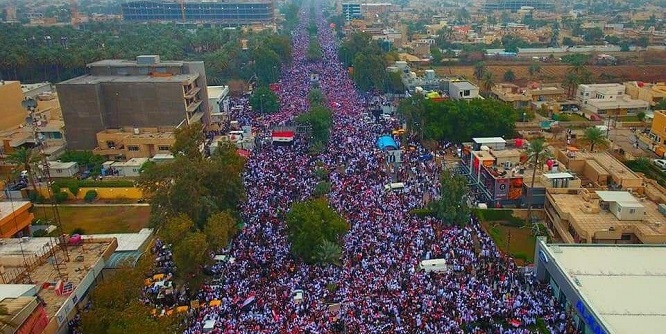The "million-man march" of the Iraqis in the streets of the capital Baghdad on Friday in protest to the illegal and destabilizing presence of the American forces and the call for shutting the "occupying forces bases" will be marked as a turning point in the countryís contemporary history, with large-scale implications not only on Iraq but the whole of the regionís political developments.

The US to decide between two choices
Over the past month and since the Iraqi parliament approved a bill to expel the foreign forces from the country, the Washington leaders, largely taken aback by the decision, have been seeking ways to move out of the impasse they are facing in the middle of the Iraqi developments.
The US, who presented various illogical justifications to reject the bill- from saying that there is no consensus among Iraqis on the withdrawal to putting pressure on the lawmakers to claiming behind-the-scenes agreement with Baghdad about stay-,after the million march found itself in a position of a chooser between staying as an occupying force and accepting the defeat and leaving Iraq as a show of respect to Iraqi constitution and the international laws.
Over the past days, the Kurdish regionís officials, mainly the Barzanis, in their meetings with the Americans expressed their interest in seeing the US keep its troops in Iraq. Still, the Kurdish pro-stay comments and Erbil violation of the constitution that gives the reference of the foreign policy and relations with other countries to the parliament are far from being able to give the American occupation international legitimacy. Amid the threats regularly issued by various Iraqi groups for the readiness to pick arms against the American forces, it seems that the US will have no way but bowing to the reality and the Iraqi will. Even those parties and politicians who secretly send signals to the White House for stay at the end of the road have to openly express their mind to the public.
Protests will transform in the upcoming days
The massive turnout in the recent protests against the American presence will have a big influence on the home Iraqi developments. The streets of the capital Baghdad and other cities have not seen calm for over three months as people demonstrated flagrant corruption, deteriorating living conditions, unemployment, and poor public services. The demonstrations have pushed the prime minister to step down and initiated a political crisis over the succession of Adel Abdul Mahdi. The crisis even deepened as some outlawed sides like the Baathists and pro-Western actors like Saudi Arabia and the UAE seized the opportunity to fuel the violence in the Arab country, destroying chances of improvement of the conditions after the PM resignation.
Meanwhile, the support voiced by some influential figures and parties to the rightful demands of the protestors who pursued comprehensive reforms beside being watchful to the vassals and subversive groups who ran foreign intelligence agenda paved the way for the spread of violence. Maximum casualties, attacks on foreign consulates, and guiding the protests towards opposition to the principles of Baghdad foreign policy all were scenarios designed by foreign intelligence agencies.
But now the grand anti-American march has turned the tide, changing the nature of the street demonstrations. While almost no patriotic Iraqi will forget the American atrocities in Iraq over nearly two decades, some of the protestors rejected the call by the powerful religious leader Muqtada al-Sadr and grand Ayatollah Sayed Ali al-Sistani. The reaction by al-Sadr was fiery, in a statement calling them agents to the foreign states. The statement by a man who has been a leading patron to the street protest movement pulled his backers out of the sit-ins arranged in main squares of the capital and other southern cities.
This al-Sadr move deeply cracked the ranks of the opposition, preparing for a transition to calm from chaotic conditions. This will allow for picking a new PM and push forward other political cases.
So, another implication of the Friday anti-occupation march was the frustration of the foreign scenarios to fuel instability and insecurity in Iraq.
US hegemony decline accelerated
After the fall of the Soviet Union which marked an end to several-decade Cold War, the US relied on the NATO military power and introduced the counterterrorism doctrine to intensify its military presence in the highly sensitive and strategic West Asia region as the ground where the unipolar global order could be clearly observed. Iraq and Afghanistan were occupied as part of the broader plan. The main US aim was to counter the deep-rooted and expanding Axis of Resistance that could seriously endanger the interests of Washington and its allies in the region mainly Tel Aviv as it awakened the regional nations against the Western colonization and encouraged them to seek independence and dignity.
The Americans extensively worked to transform the regional security to the detriment of the Resistance camp using a set of ways and soft and hard power instruments, mainly in Syria, Iraq, and Lebanon. Although the strategy already met its failure as the passage of time showed and the Resistance and its embracers witnessed a surge in their power, the Friday multi-million man rallies against the American presence which is apparently in opposition to the will of the nation represented an ending shot to the American plans in the region to save its waning hegemony. The noteworthy point is that the compulsory American withdrawal from Iraq will give rejuvenated optimism and energy to the anti-American movements and groups across the region.
LINK: https://www.ansarpress.com/english/13296
TAGS:






























 Violation of the sovereignty and rights of afghan citizens by America
Violation of the sovereignty and rights of afghan citizens by America




